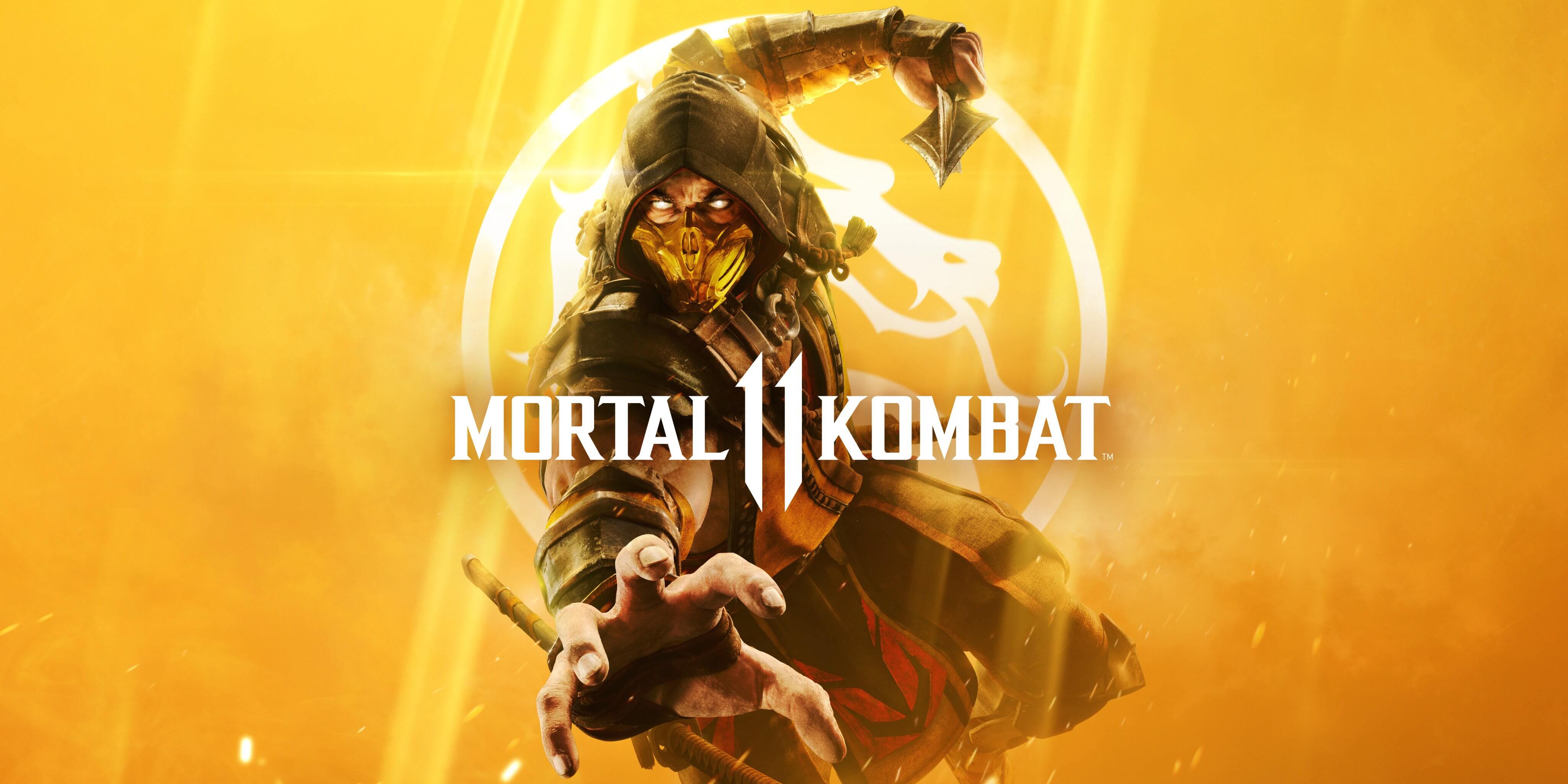 2015's Mortal Kombat X signaled the beginning of an evolutionary turn for Netherrealm Studios' storied fighting game series, featuring fresh new characters, a compelling story and the ability to select different fighting styles for every combatant. Mortal Kombat 11 continues this evolution, but not every aspect of the game is moving in the right direction.
2015's Mortal Kombat X signaled the beginning of an evolutionary turn for Netherrealm Studios' storied fighting game series, featuring fresh new characters, a compelling story and the ability to select different fighting styles for every combatant. Mortal Kombat 11 continues this evolution, but not every aspect of the game is moving in the right direction.
Though it taps into the series' entire 27-year history, Mortal Kombat 11 is the second sequel to Netherrealm Studios' 2011 retcon/reboot, which was simply titled Mortal Kombat. The 2011 release took Mortal Kombat back to its roots. It got rid of the clumsy 3D fighting the series had become, replacing it with stylish, impactful battles along a 2D plane. It also rolled back the series' storyline, retelling the events of the first three Mortal Kombat games with a more satisfying and cinematic narrative.
Mortal Kombat X picked up 25 years later, introducing new characters like Cassie Cage, the daughter of Johnny Cage and Sonya Blade, and Jacqui Briggs, the daughter of cybernetic special forces member Jax. Older, wiser versions of classic characters fighting side-by-side with the next generation made for an exciting storyline and helped Mortal Kombat X feel like a brand-new direction for the series.
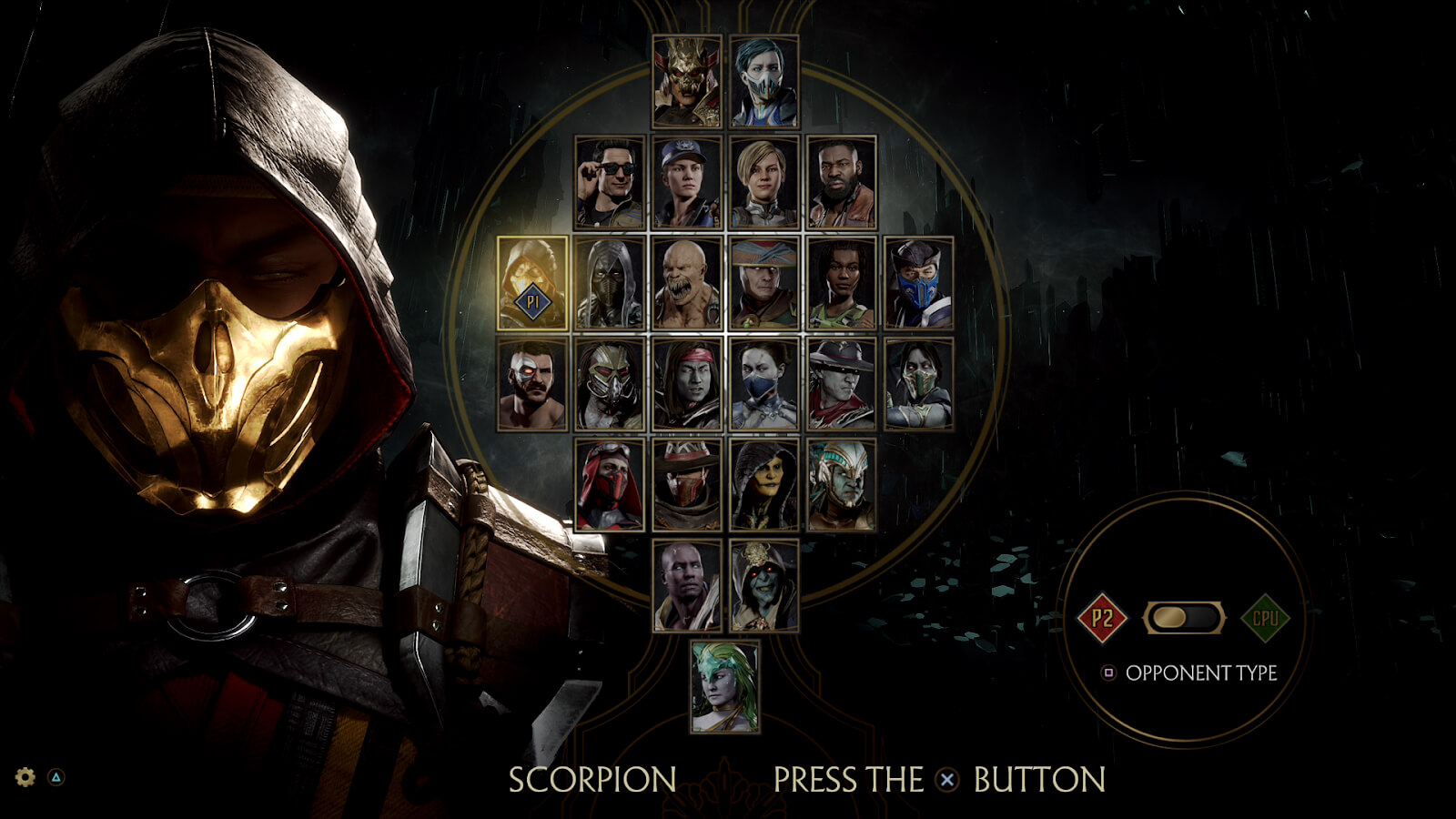
Mortal Kombat 11, out now for the PC, PlayStation 4, Xbox One and Nintendo Switch, builds upon the story and game mechanics established in Mortal Kombat X beautifully, for the most part. The game's story is even more involved and engaging. The fighting feels more deliberate and calculated. Where Mortal Kombat X featured multiple fighting styles for each character, Mortal Kombat 11 lets players create their own fighting styles, picking and choosing which moves they wish to include. The treasure-filled Krypt returns, and it ... well, the Krypt could use some work. We'll get there.
Test Your Might
Netherrealm Studios makes fighting games that hit hard. Between the ongoing progression of Mortal Kombat and its sister series, the DC superhero-powered Injustice, Netherrealm's fight games have exquisitely calculated fighting. They have a slower, more methodical combat system than most other fighting games. Players execute fast and brutal moves, but the fight moves at a measured pace. There is time to react, time to ponder how one's opponent might react to a combo or a blocked attack. There's time to think, which is ironic given Mortal Kombat's trademark mindless gory violence. It's like chess, only the pieces murder each other.

Mortal Kombat 11 continues the trend, adding more ways to outmaneuver foes. There are two new meters in the corner of the screen, defense and offense. The defense meter lets players perform special escapes, like forward and backward getup rolls. The offense meter lets players tweak existing moves, adding more damage or additional hits. Managing and taking advantage of these two new meters can make a huge difference in the outcome of a battle. The new Perfect Block mechanic gives players who time defense perfectly a slightly wider window to counterattack, making tapping the block button more attractive than simply holding it down.
Also new in Mortal Kombat 11 are Fatal Blows, gruesome, blood-drenched attacks each character can perform once per round if their health meter drops below 30 percent. These last-ditch desperation moves do a ton of damage, but they are easily blocked, easy to anticipate, and, since each player can only perform them once in a round, best saved for the clutchiest of clutch moments. They're also ridiculous, since each involves acts of violence that would kill any normal person. It's hilarious to watch a character to get stabbed deep in both of their eyes and then recover as if nothing happened. It's part of the game's charm.
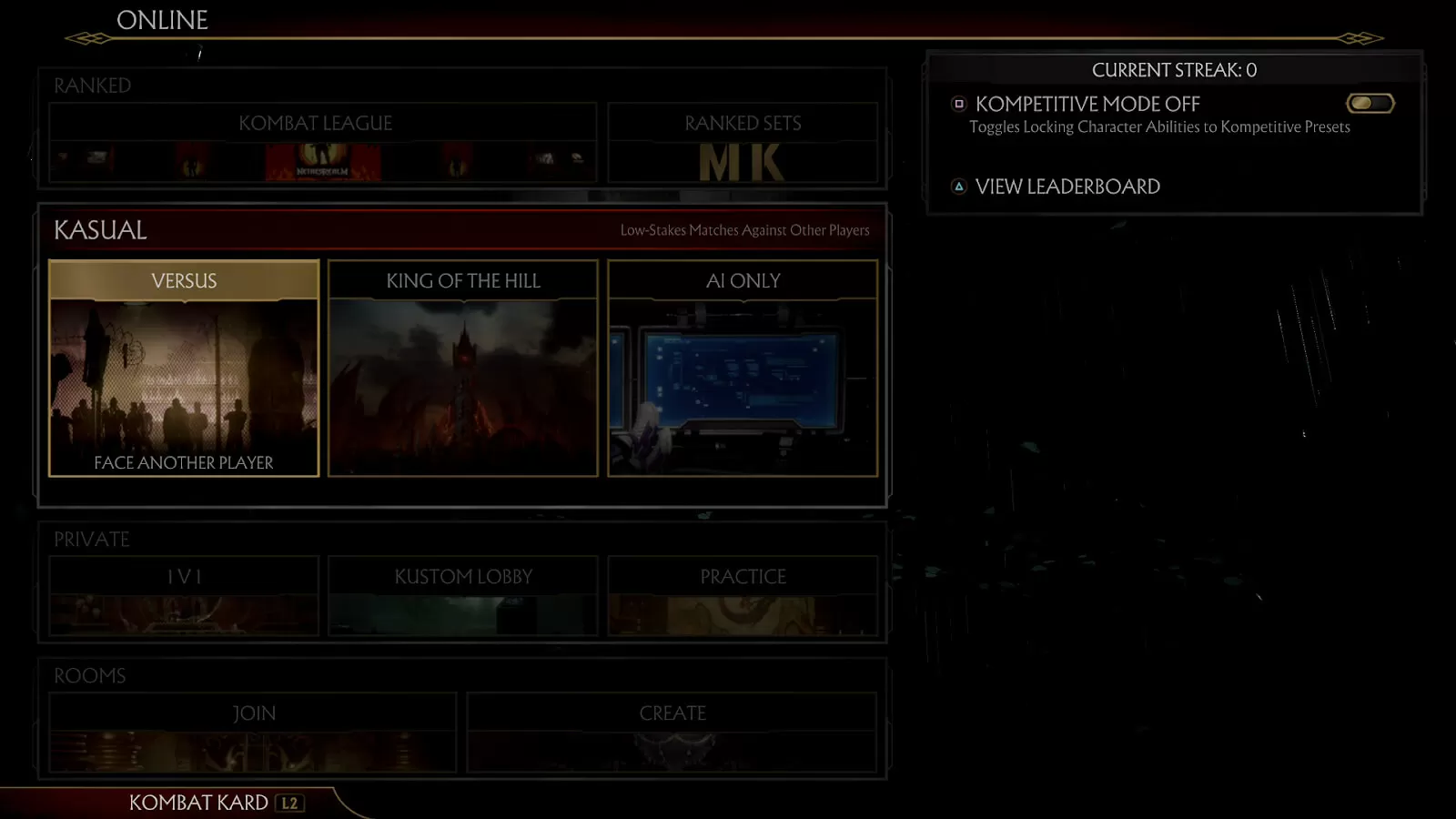
Mortal Kombat 11 includes many ways for players to put its brutal fighting mechanics to the test. Multiplayer-minded fighters can hop into ranked sets online in preparation for the upcoming "Kombat League" series, which launches a month after the game's release. Players can create private rooms with custom rulesets, play King of the Hill and even create custom practice matches to hone skills. Local competitors can play against friends however they see fit, including tournaments.
Solo players can head to the Klassic Towers section to take on traditional single-player modes like arcade, survival or the endless gauntlet. It's also where players can unlock "what if?" endings, to learn what each character might do if they defeated Kronika, the game's new big bad, and gained her power over time.
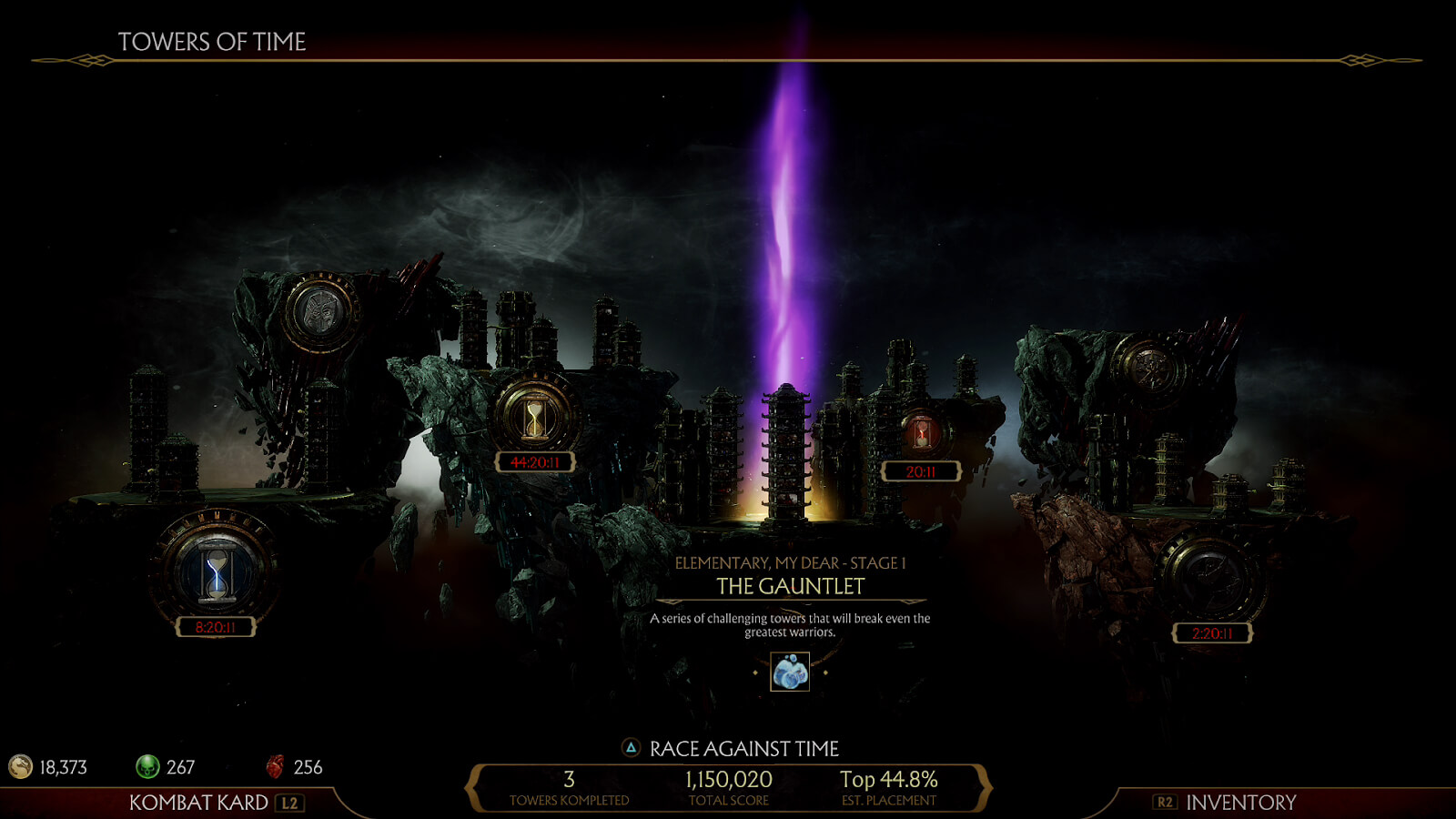
The Towers of Time are a series of rotating themed challenges that offer players various rewards for completion, including character outfits, equipment and currency to unlock those things in the game's Krypt. At launch many players, myself included, are finding some of the Tower of Time challenges ridiculously difficult. Level modifiers like player-seeking death missiles and gouts of super-damaging fire are making completion near impossible, even when players stack consumable buffs on their fighters.
Fortunately, Netherrealm has already tweaked the difficulty of the Towers of Time post-launch. The frequency of player-damaging hazards has been reduced, unblockable hazards have been made blockable, and enemy health has been reduced. In a Kombat Kast stream on Twitch, developers stated an upcoming patch will further lower the difficulty of the towers.
There's also the story mode, where you can practice having feelings about series' regulars. It's excellent.
Test Your Feels
Netherrealm is one of the best storytelling studios in the fighting game business. They craft stories heavy on emotional beats, plot twists and cinematic pageantry. But if someone had told me ten years ago that a Mortal Kombat game would make me cry, even a little bit, I would have stared at them all funny-like.
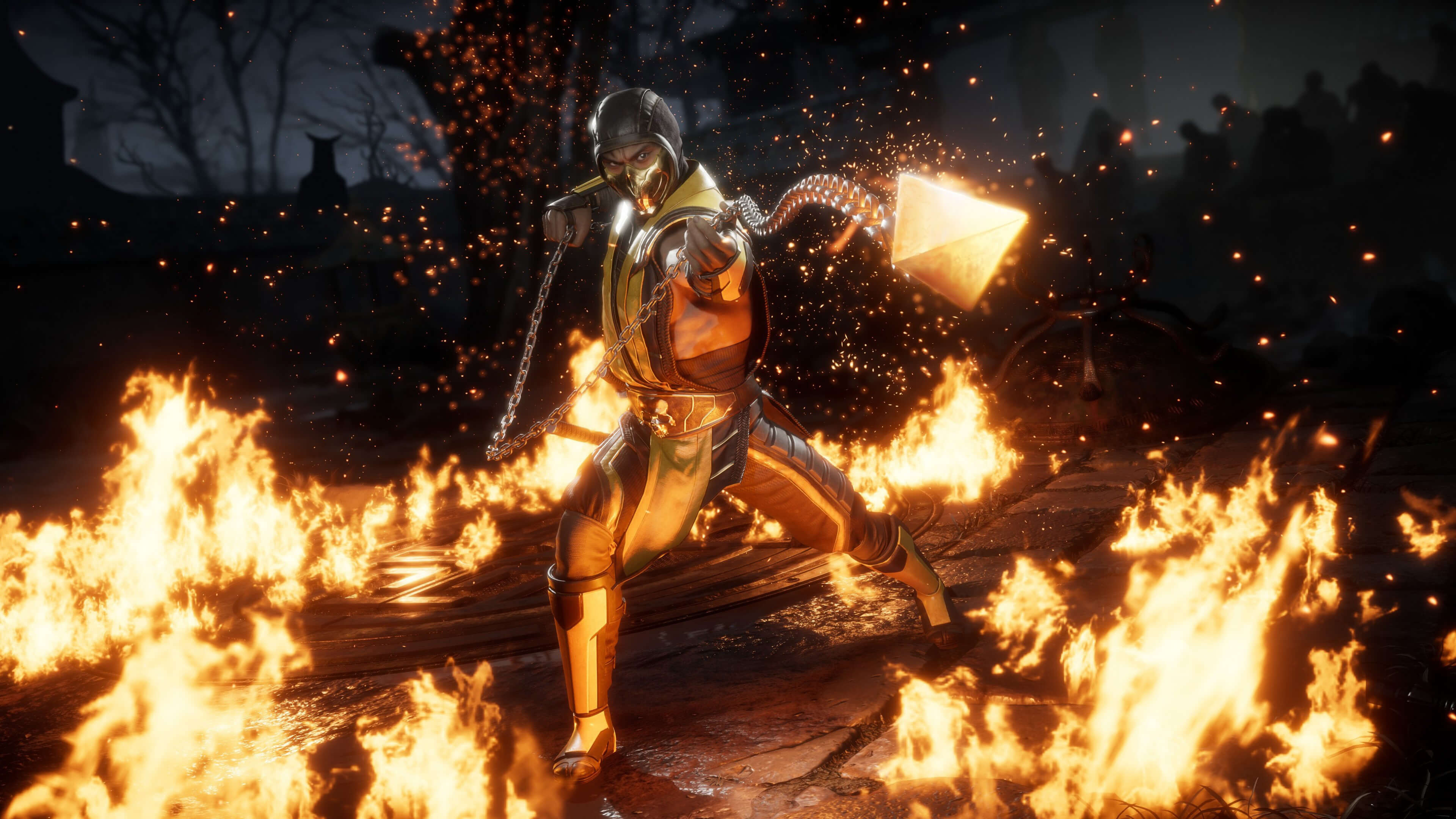
When a classic character gets a big win, I cheered. When someone dies, outside of the normal, fatality-style dying, I teared up. I gritted my teeth and shouted "FUCK YEAH!" at least once.
Following the events of Mortal Kombat X, Cassie Cage is promoted to commanding officer in the Earth special forces (no nepotism there from General Sonya "Mom" Blade) and leads a mission to take down the fortress of Shinnok, the big bad of the previous game. Though the mission is successful, Earth's forces are struck a major blow. Then along comes Kronika, goddess of time, who rebuilds Shinnok's ruined fortress. She's got a plan to reset the timeline, leaving the Earth's primary protector, Raiden the thunder god, out of the loop. Using her timey-wimey powers, she pulls heroes and villains from the early days of Mortal Kombat to help put her plan in motion.
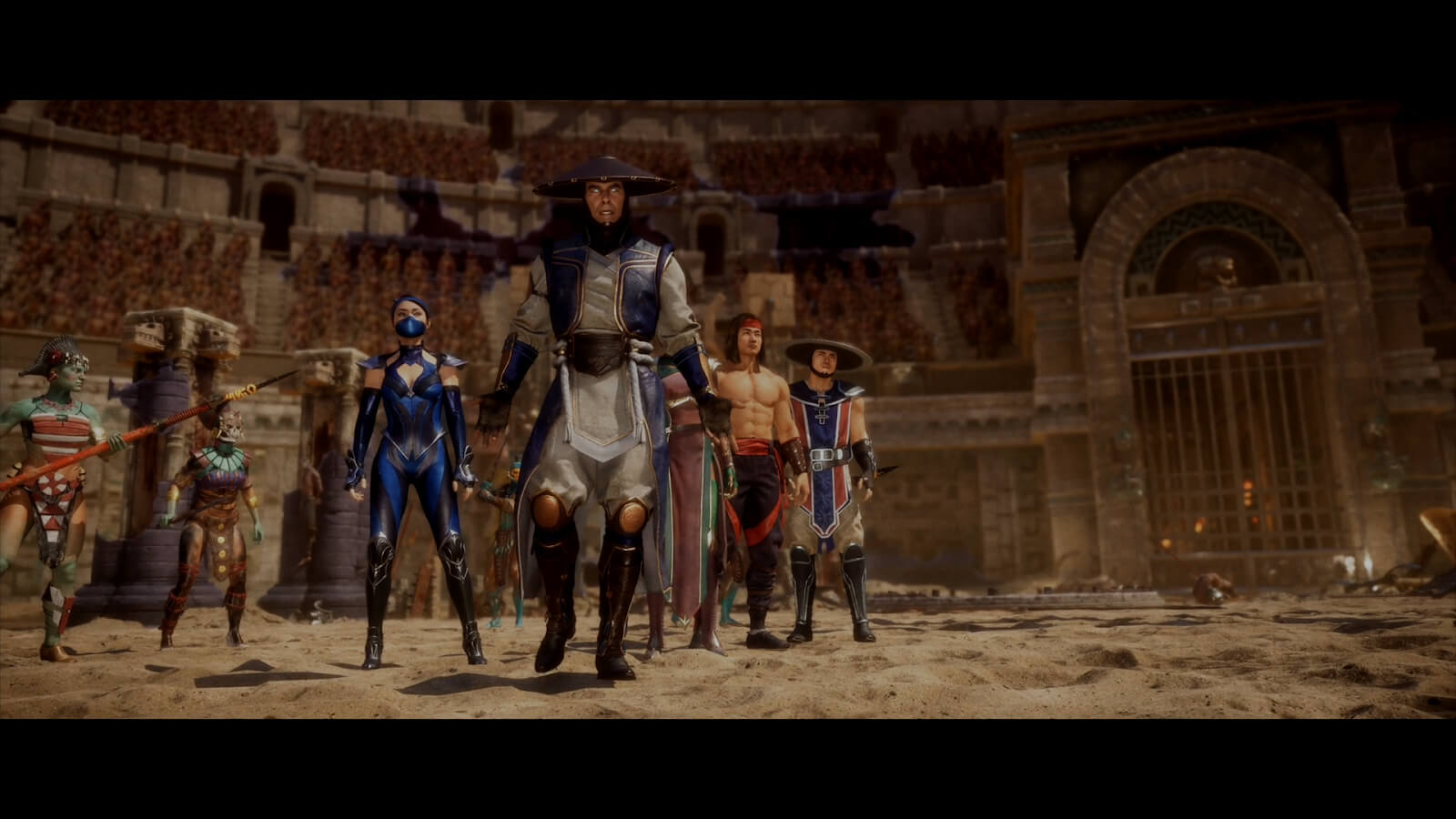
Older and younger versions of Mortal Kombat characters interacting with each other is just as charming an idea as it sounds. The plot is filled with outstanding character moments, which I will not spoil here. I wrote more in-depth and slightly more spoilery about the story mode earlier this week, if you want to know more.
The only downside is the story follows the same one or two characters per chapter formula as previous installments. As the story's 12 chapters unfold, players are bound to be saddled with a character they don't like or don't know how to play. Fortunately, Mortal Kombat 11 is a damn fine teacher.
Test Your Learning Ability
Mortal Kombat 11's tutorial is the best I've come across in a fighting game. It covers the basics---attacking, blocking, special moves---as expected. Then it goes further: not just super moves and how to perform complex fatalities without having to purchase "easy fatality" tokens. I'm talking tearing down moves into their component frames and explaining why one move might have a slight advantage over another. How a move that is devastating when it lands can be an excellent opportunity for punishment if blocked.
Mortal Kombat 11 doesn't just list combos. It explains how players can build them on their own and which moves work together well. Character-specific tutorials don't just list moves. They demonstrate how the moves are performed, explain the advantages and disadvantages and suggest ways each move can be expanded into a more complex combo.

As I play the game against both computer-controlled combatants and other players, I do more than simply react. I watch what my opponents do and anticipate their response to my actions, using knowledge I gained from the complex tutorial. I still lose a lot, but I'm not losing by nearly as much as I did in previous games. I've been well taught.
Test Your Character (Re)Creation Skills
A major, welcome new addition to Mortal Kombat 11 is the ability to create custom variations of the game's characters. Players select a character, choose a costume and assign three pieces of modifiable gear. My custom Jade is wearing the white and gray "Kamanchaka" skin with the "Daughter of Prince Jobashel" mask, "Kitana's Favor" razor-rangs and a staff called "Sparkspitter."
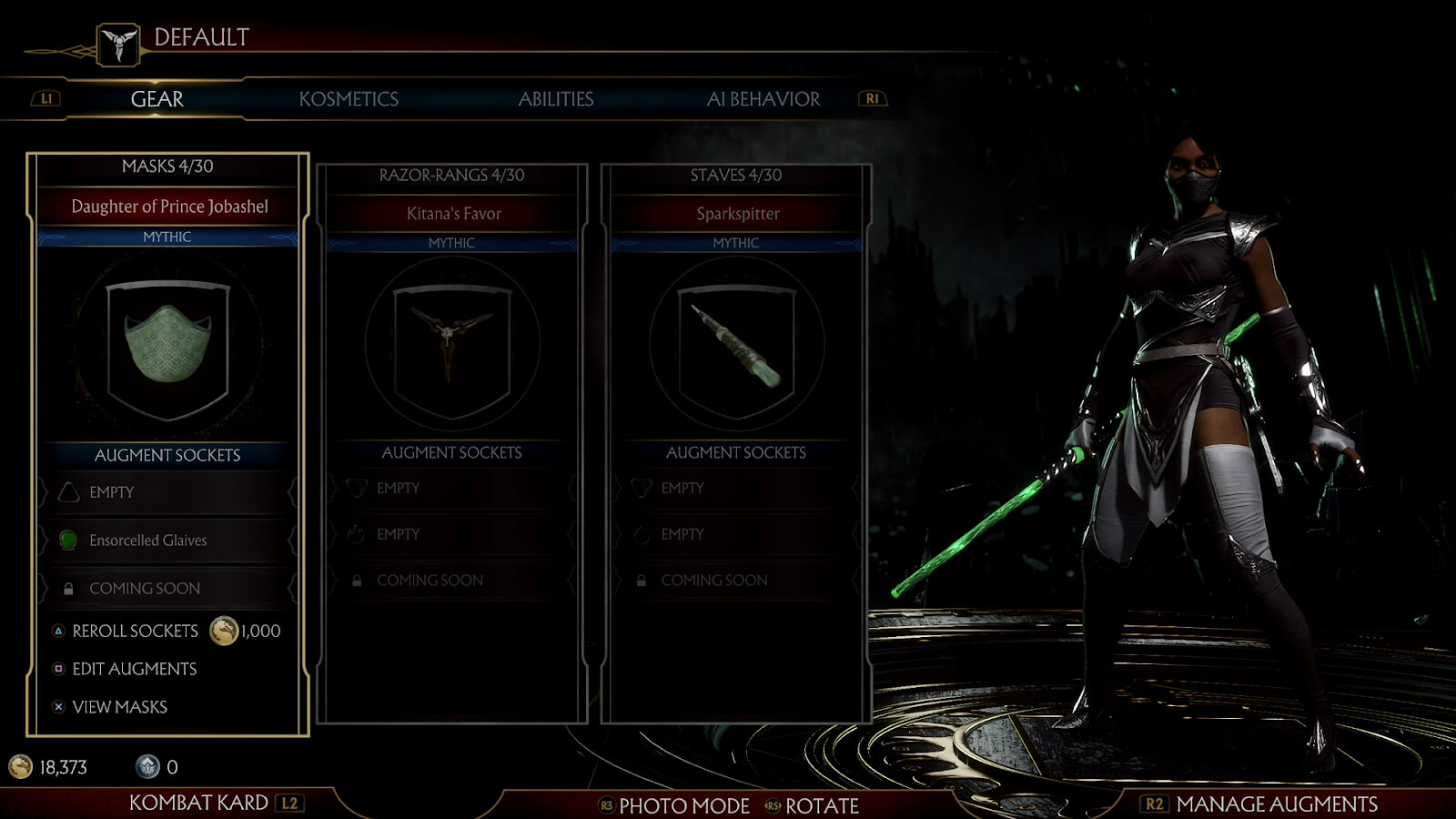
Once dressed, a custom character's moves are selected. Each character has a series of preset moves, or you can select a number of moves from a list, creating custom combinations.
Putting together a custom fighter is fun. There are a ton of different skins with multiple color variations for each character---Jade has 62 different outfits to unlock. Same goes with equipment. Jade eventually gains access to 30 different masks.
The problem comes in how players access those skins and pieces of equipment, and how that equipment is upgraded. Gear and outfits can be won through tower battles, but most of it is acquired via the Krypt. Mortal Kombat 11's Krypt is not great.
Test Your Patience
In its early moments, Mortal Kombat 11's Krypt seems like a vast improvement over earlier incarnations of the series' treasure-collecting playground. Building on Mortal Kombat X's version, which was a first-person dungeon-crawling adventure, this latest Krypt is a third-person adventure. Players take on the role of a generic fighter who journeys through classic Mortal Kombat locales, unlocking chests using coins, souls or hearts rewarded through playing in other parts of the game. In a Metroidvania-style twist, players unlock pieces of equipment like wall-smashing hammers or secret-sensing blindfolds as they explore, revealing new paths to travel and treasures to discover.
It would be perfect, if not for the fact that treasure chest rewards are randomized this time around. Instead of being able to look up a map created by other players to find out which chest contains which skin, piece of equipment, concept art, crafting material or enhancement, which was part of the fun of previous Krypts, there are no assurances.
What there are is three different types of currency that must be collected to unlock different chest types---coins, souls and hearts. Coins are pretty easy to come by, regularly rewarded in large amounts for completing towers, daily tasks or just winning matches. Souls and hearts are much harder to get, doled out incredibly sparingly as tower mission or battle rewards. Performing a fatality rewards a player with one heart. A heart chest requires 250 hearts to unlock. That's a lot of fatalities to unlock one chest.
So while Jade has 62 different costume variations, there's no easy way to get the one I want. All I can do is grind and hope for the best. Same with equipment. When my three pieces of equipment level up and enhancement slots are unlocked, there's no knowing if the unlocked slots will match the enhancements I've collected. That leads to more grinding. So much grinding.

Much noise is being made about Mortal Kombat 11's "monetization," mostly tied to this grind. Monetization isn't the issue. There is a premium currency, called Time Krystals, which can be purchased with real money or slowly collected through gameplay. There is a premium store with a daily random rotation of three skins, a piece of equipment and an unlockable Brutality, Fatality or other cosmetic item, all of which can be purchased with these Time Krystals.
It's monetization, but it's not obnoxious. I cannot use Time Krystals to earn coins or souls or hearts. I can buy one of five things. The issue is the randomness of acquiring items and the grind required means that if a piece I am looking for pops up in that premium store rotation, the impetus to buy it is strong. If treasure chests in the Krypt were static and I decided to grab a piece of gear instead of grinding currency, that would be one thing. But this is different. It's shitty, and I do not like it.
Reacting to player complaints, developer Netherrealm has a patch planned to increase currency rewards throughout the game. Thank goodness. How am I supposed to build the perfect A.I. character without the right gear?
Test Your Artificial Intelligence
Not only can players create custom characters in Mortal Kombat 11, they can make those custom characters fight using artificial intelligence. It's essentially the same A.I. character system as was introduced in Injustice 2, only with slight tweaks. I love it.
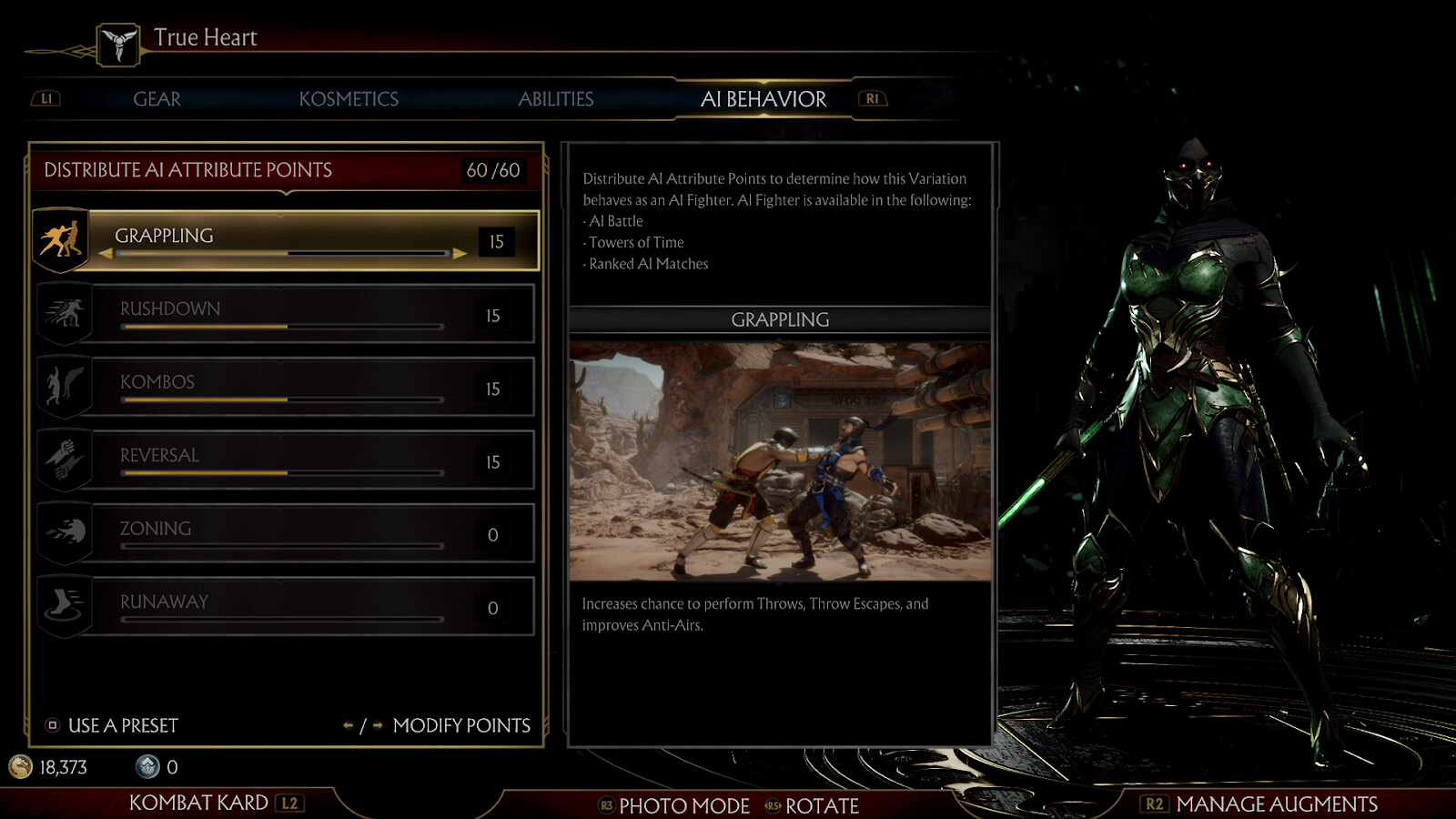
Each A.I. character has 60 points to spread across five attributes: grappling, rushdown, kombos, reversal, zoning and runaway. How those 60 points are distributed determines how the AI character performs.
A.I. fighters can be used in the game's A.I. battle mode, in which players set up teams of three defenders, which other players can choose to pit their A.I. attackers against. It's a neat way to earn rewards while offline or otherwise without direct participation. A.I characters can also be used to tackle select challenges in the Towers of Time or Klassic Towers modes. I set my A.I. Jade against the endless tower, and she tore through 20 opponents before a particularly nasty Kabal took her down.
But the best place to play A.I. characters is via ranked A.I. matches in the game's online multiplayer menu. Here, two players match up and pit their creations against each other in what amounts to virtual cockfights. It's ridiculous how entertaining it is to just sit back and cheer while your A.I. buddy does all the work. Even the not fighting in Mortal Kombat 11 is entertaining.
Test Results
Riding the momentum generated by Mortal Kombat X, Mortal Kombat 11 continues to propel the series forward, while still maintaining the over-the-top bloody charm that endeared it to fans over the years. I'd say the series was back and bloodier than ever, but I hardly even notice the gore anymore.

The gore is still there, of course. Fatalities, brutalities, quitalities and so-called "fatal blows" spray the screen with blood and brains and other bits. But they don't feel as essential to the series as they once did. There's an exciting story being told. There's a methodical fighting game engine that's really come into its own over the past eight years. Mortal Kombat is much more than it once was, and it's getting better with every game.
